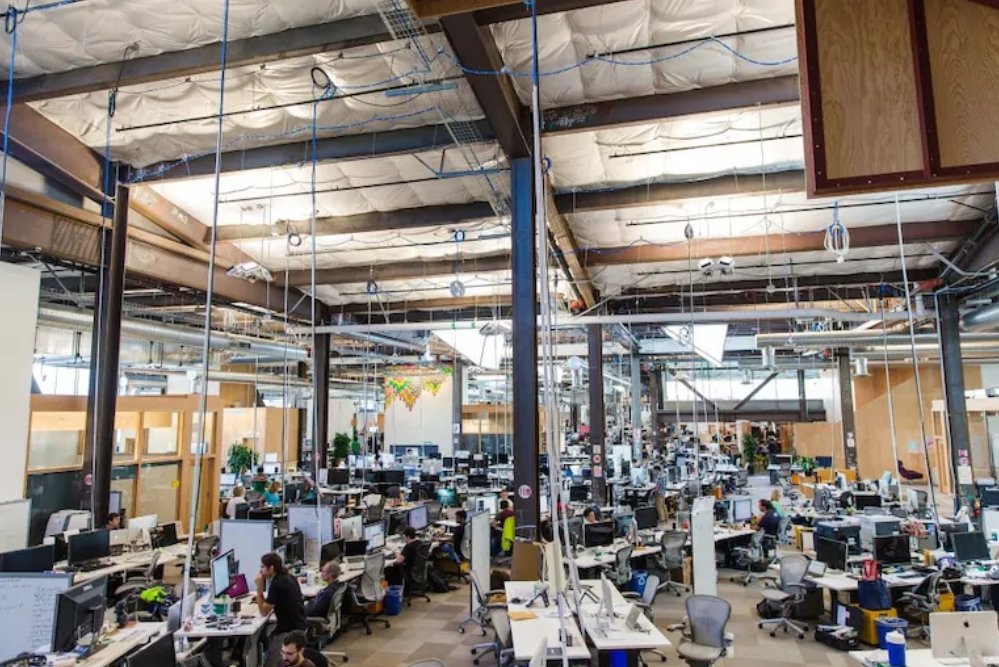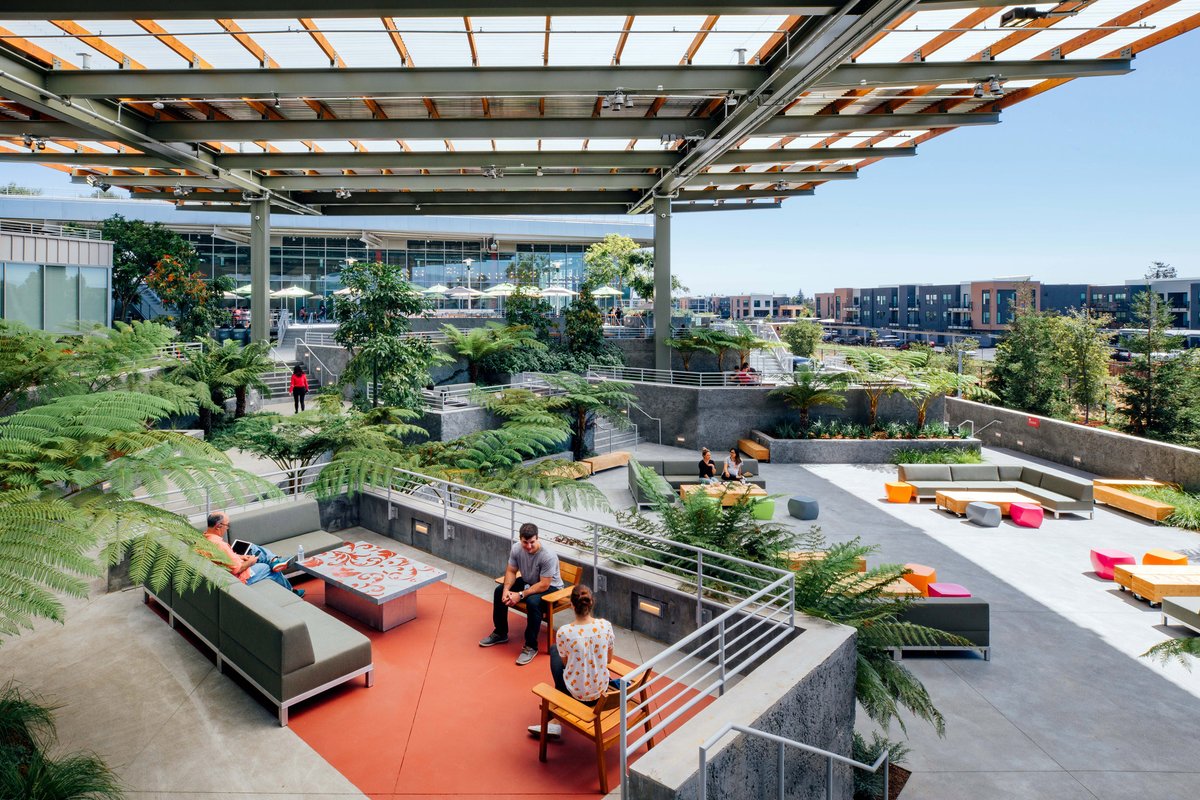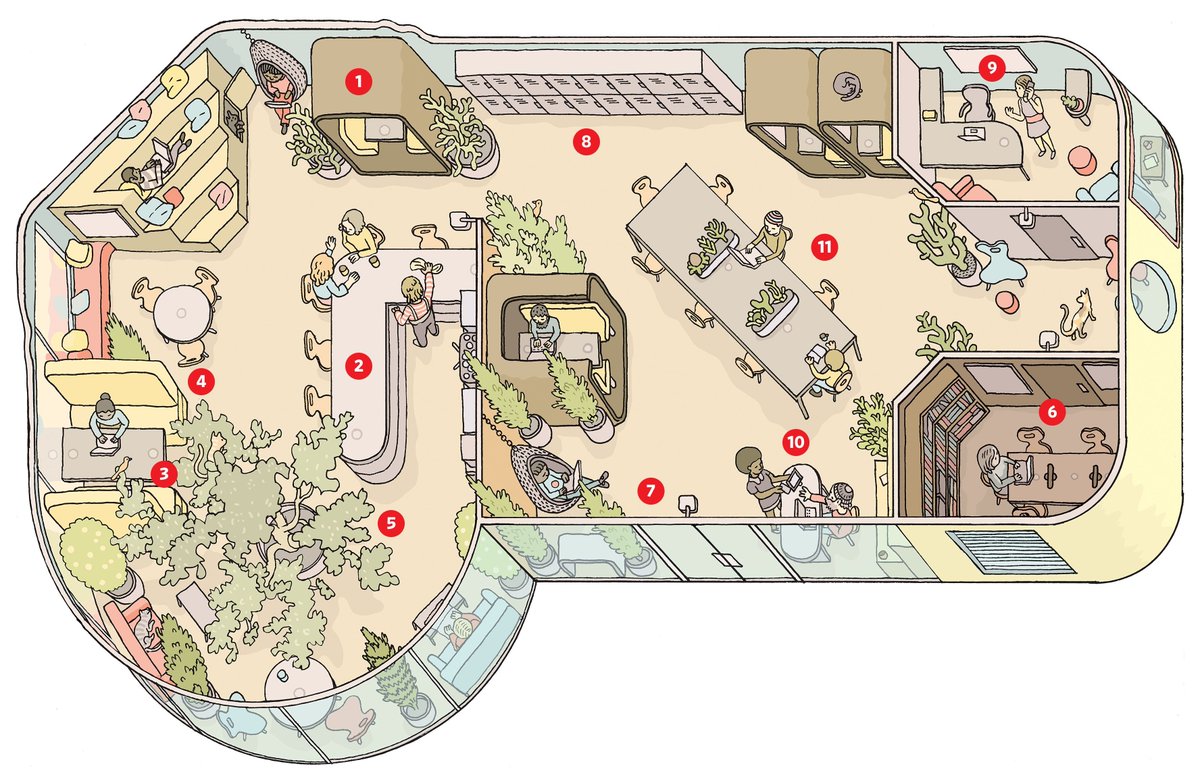The pandemic may not kill the open-plan office, but it has highlighted its anti-human preposterousness.
So what's next?
Tech companies have a new vision to sell: The "dynamic" office https://www.wsj.com/articles/goodbye-open-office-hello-dynamic-workplace-11599883273
So what's next?
Tech companies have a new vision to sell: The "dynamic" office https://www.wsj.com/articles/goodbye-open-office-hello-dynamic-workplace-11599883273
Facebook is a case study in changing mores of office layout and culture.
In 2015, Zuckerberg proudly declared the opening of the world's largest open-plan office.
In 2018, Facebook opened an even larger open-plan office, but with a fundamentally different layout. (thread )
)
In 2015, Zuckerberg proudly declared the opening of the world's largest open-plan office.
In 2018, Facebook opened an even larger open-plan office, but with a fundamentally different layout. (thread
 )
)
Digging into things, here's what I was able to suss out: In 2015 Facebook opened "MK 20", 433,555 square feet of bullpen. Desks crammed cheek by jowl. The nightmarish apotheosis of everything anti-human about the open plan office.
https://www.washingtonpost.com/news/the-switch/wp/2015/11/30/what-these-photos-of-facebooks-new-headquarters-say-about-the-future-of-work/
https://www.washingtonpost.com/news/the-switch/wp/2015/11/30/what-these-photos-of-facebooks-new-headquarters-say-about-the-future-of-work/
At the time, Zuckerberg touted MK 20 as a place for "frictionless" work and collaboration. Of course, what research had already shown was that such layouts make people less productive, less social, more likely to get sick. https://www.wsj.com/articles/goodbye-open-office-hello-dynamic-workplace-11599883273
Three years pass. Facebook seems to have learned a few lessons. Same Menlo Park headquarters, same architect (Frank Gehry), same builder even. In 2018 the company an /even bigger/ open-plan office, MPK 21. But this one has a slightly different emphasis.
https://www.wallpaper.com/architecture/frank-gehry-office-facebook-menlo-park-hq-san-francisco-opens
https://www.wallpaper.com/architecture/frank-gehry-office-facebook-menlo-park-hq-san-francisco-opens
Meanwhile, other companies, including Salesforce and Twitter all decide to do something about the ways people don't really like classic open plan offices.
They get into "activity based working" and invent the "dynamic office."
Then the pandemic hits. https://www.wsj.com/articles/goodbye-open-office-hello-dynamic-workplace-11599883273
They get into "activity based working" and invent the "dynamic office."
Then the pandemic hits. https://www.wsj.com/articles/goodbye-open-office-hello-dynamic-workplace-11599883273
We talk about what it's going to take to get people back to the office, but the reality is people who can continue to work remotely aren't going to stop until we hit herd immunity.
That's what I've heard /over and over again/ from the people tasked with "bringing them back."
That's what I've heard /over and over again/ from the people tasked with "bringing them back."
While offices are shuttered, companies have to consider a new reality: Even when people can come back, will they? And how many days per week? One head of "people ops" told me she cannot predict with any certainty how many people will be in her offices a year from now. No one can.
So the future of the office -- the future of work itself, for those privileged to work remotely -- hangs in the balance. As does the future of all that commercial real estate.
Companies are going to have to /entice/ workers to come back.
Companies are going to have to /entice/ workers to come back.
Offices will become a place of collaboration, because why else would you show up? They'll also continue to be, and this isn't discussed often enough, a refuge from home. Maybe a third of workers are itching to come back, a third will come back sometime, a third won't, ever.
So the future of work, as embodied by the future of the office, is a place with a variety of workspaces, but the emphasis is on getting people together. The opposite of what we're doing now, and a thing most all of us hunger for. https://www.wsj.com/articles/goodbye-open-office-hello-dynamic-workplace-11599883273
Bonus for people who managed to make it this far into this thread:
There's nothing paradoxical about Facebook leasing an additional 730,000 square feet of office in NYC, while also announcing work from home for all.
They spoke with me about their plans. https://www.wsj.com/articles/goodbye-open-office-hello-dynamic-workplace-11599883273
There's nothing paradoxical about Facebook leasing an additional 730,000 square feet of office in NYC, while also announcing work from home for all.
They spoke with me about their plans. https://www.wsj.com/articles/goodbye-open-office-hello-dynamic-workplace-11599883273
Offices are "important to Facebook's culture" said a spokeswoman for the company. To get people to collaborate and invent new stuff, and, frankly, to inculcate your corporate ethose, you gotta get them together in person. https://www.wsj.com/articles/goodbye-open-office-hello-dynamic-workplace-11599883273
For a lot of companies the office is going to change, maybe radically. But the idea that we're going remote forever flies in the face of all evidence.
Cities aren't going to die, the workplace isn't going to die. But it might be better. If we're lucky. https://www.wsj.com/articles/goodbye-open-office-hello-dynamic-workplace-11599883273
Cities aren't going to die, the workplace isn't going to die. But it might be better. If we're lucky. https://www.wsj.com/articles/goodbye-open-office-hello-dynamic-workplace-11599883273

 Read on Twitter
Read on Twitter




